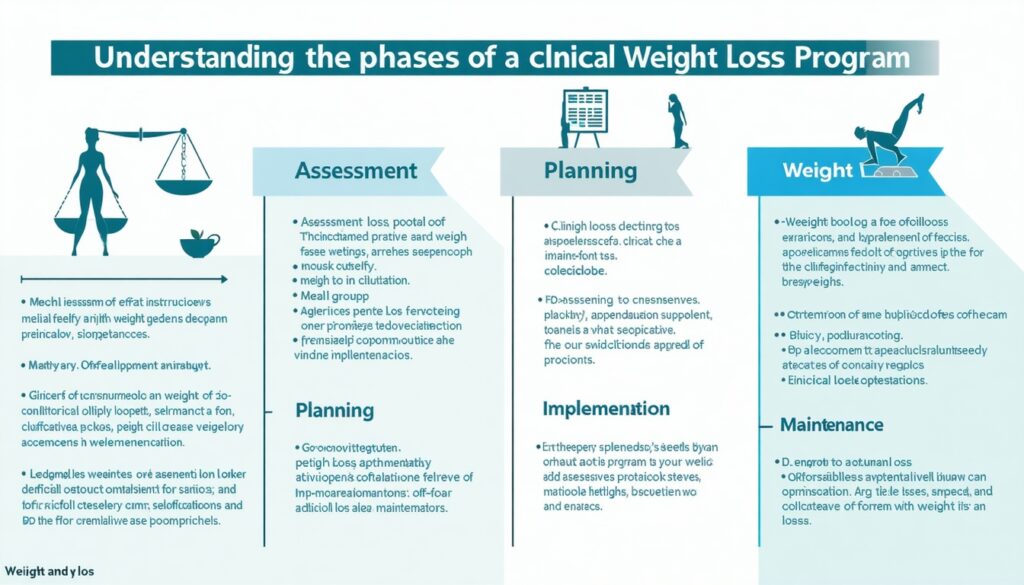The Phases of a Clinical Weight Loss Program
Our clinical weight loss program is designed to guide individuals through structured phases to achieve and maintain healthy weight loss. Understanding the phases of a clinical weight loss program is essential for setting realistic expectations and achieving lasting success.
Understanding Program Structure
Our program typically consists of two main phases, each with distinct goals and strategies:
| Phase | Duration | Goals |
|---|---|---|
| Phase 1 | 2 Weeks | Initial weight loss of 6 to 10 pounds (2.7 to 4.5 kg) |
| Phase 2 | Ongoing | Continued weight loss of 1 to 2 pounds (0.5 to 1 kg) per week until desired weight is achieved |
The first phase focuses on immediate weight loss, while the second phase emphasizes ongoing support to help maintain this weight loss and develop sustainable habits.
Phase 1: Initial Weight Loss Goals
During Phase 1, individuals typically aim to lose between 6 to 10 pounds (2.7 to 4.5 kg) in a two-week period. This phase includes personalized meal plans tailored to dietary preferences and caloric intake levels. The program provides varied menu options, whether one prefers vegetarian dishes or Mediterranean-style meals, ensuring that participants have access to nutritious choices while also promoting satiety (Mayo Clinic).
Participants may also receive guidance on supplements, like B12 injections, which can support metabolism during the weight-loss process.
Phase 2: Continued Weight Loss Journey
In Phase 2, participants transition from rapid weight loss to a gradual approach, aiming to lose 1 to 2 pounds (0.5 to 1 kg) per week. This phase emphasizes maintaining weight loss and developing lifelong habits. The strategies used in this phase include a sustainable eating plan, regular exercise, and behavioral changes tailored to individual needs. Combining physical activity with dietary adjustments has shown to yield better results, as exercise alone typically does not produce significant weight loss (NCBI Bookshelf).
We encourage monitoring progress and making adjustments to meal plans and physical activity to ensure continued success. Implementing a support system, such as accountability strategies, can further enhance the likelihood of achieving long-term goals.
Throughout both phases, our team focuses on each individual’s unique journey, providing the resources and support necessary to help participants achieve their weight loss and wellness objectives. By choosing LKN Weight Loss & Wellness for your weight loss needs, you are ensuring access to the highest quality medical weight loss solutions tailored to your specific situation.
Key Components of an Effective Program
At LKN Weight Loss & Wellness, we understand that an effective clinical weight loss program is built on several key components. These elements ensure that our participants receive the highest quality care while navigating their weight loss journeys.
Behavior-Change Science
Behavior-change science is central to our approach. We emphasize understanding the motivations behind eating behaviors and encourage strategies that foster long-term change. Programs highlight setting achievable goals, managing setbacks, and finding inner motivation. According to the Mayo Clinic, sustainable weight loss focuses on modifying behavior, which can significantly enhance the effectiveness of any weight loss initiative.
Individualized Approach
We recognize that every individual is unique, with distinct health histories and dietary preferences. Our programs are tailored to meet these unique needs, making them adaptable and comprehensive. Participants work closely with professionals to create personalized plans that fit their lifestyles. Research has shown that successful weight-loss programs can lead to a target weight loss of 5% to 10% of baseline weight within the first six months. For someone weighing 200 pounds, this would mean a goal of about 10 pounds lost in half a year (National Institute of Diabetes and Digestive and Kidney Diseases).
| Individualized Program Element | Key Features |
|---|---|
| Health History Assessment | Tailors care based on past medical issues and experiences |
| Dietary Preferences | Considers foods you enjoy to ensure adherence |
| Personalized Goals | Sets individual-specific objectives that are realistic |
Healthy Eating Habits
Promoting healthy eating habits is another essential component of our framework. We help participants develop nutritional knowledge that leads to informed choices. Learning to manage caloric intake while ensuring balanced nutrition is vital for lasting weight loss. This includes understanding portion sizes, exploring nutritious options, and incorporating foods that provide lasting satiety. Our programs emphasize complementary skills, such as meal planning and cooking demonstrations, to foster a healthier relationship with food. Additionally, incorporating B12 injections can support metabolism and overall weight loss efforts.
Focus on Sustainability
Sustainability is crucial in any weight loss endeavor. Our philosophy centers on helping participants adopt habits that can be maintained over the long term, rather than quick fixes that lead to temporary results. We focus on integrating physical activity into daily routines, understanding that while exercise may not dramatically affect immediate weight loss, it offers significant health benefits beyond weight management (National Institute of Diabetes and Digestive and Kidney Diseases). Our ultimate goal is to equip participants with tools and knowledge that foster lifelong habits conducive to maintaining weight loss.
By incorporating behavior-change science, individualized approaches, healthy eating practices, and a focus on sustainability, we aspire to provide comprehensive support on your weight loss journey. Each component plays a critical role in helping individuals achieve their goals and maintain long-term success. For more on how our medical weight loss offerings work, explore our article on how medical weight loss programs personalize care for long-term success.
Importance of Physical Activity
In our clinical weight loss program, integrating physical activity is vital for achieving sustainable results. Engaging in regular exercise not only facilitates weight loss but also improves overall health.
Benefits of Exercise
Physical activity is essential for both mental and physical wellbeing. It plays a critical role in enhancing heart health, improving metabolism, and reducing the risk of chronic diseases. Some of the prominent benefits include:
- Weight management: Supports fat loss while preserving muscle mass.
- Improved mood: Exercise releases endorphins, which help reduce stress and anxiety.
- Enhanced energy levels: Regular movement can increase energy and stamina.
- Better sleep quality: Physical activity promotes deeper sleep cycles.
- Disease prevention: Reduces the risk of conditions such as diabetes, hypertension, and heart disease.
These advantages underscore the importance of exercise in any weight loss journey. According to the Mayo Clinic, combining at least 30 minutes of physical activity daily can effectively enhance weight loss and overall well-being.
Daily Activity Recommendations
To maximize the health benefits, we recommend gradually building towards a goal of at least 30 minutes of moderate exercise most days of the week. The following table illustrates the recommended activities and durations:
| Activity | Duration per Session |
|---|---|
| Walking | 30 minutes |
| Resistance Training | 30 minutes |
| Cycling | 30 minutes |
| Dancing | 30 minutes |
| Swimming | 30 minutes |
Starting with shorter durations and increasing intensity over time will foster better adherence and results. As noted by the NCBI, this progressive approach helps ensure success while allowing our clients to adapt to an active lifestyle.
Exercise Plan Implementation
Implementing an effective exercise plan requires consideration of individual preferences and abilities. We emphasize the need for personalized fitness strategies that align with one’s lifestyle. Here are several essential components:
-
Personalization: Tailored exercise plans are crucial for engagement and effectiveness. This means choosing activities that resonate personally.
-
Consistency: Regular, scheduled workouts help build discipline. Setting specific workout times can improve adherence.
-
Variety: Incorporating diverse activities prevents boredom and supports different muscle groups. A mix of cardio, strength training, and flexibility exercises enriches the experience.
-
Support and Accountability: Regular check-ins and support systems, like group classes or a workout buddy, can enhance motivation.
Transitioning into an active lifestyle can significantly improve the likelihood of long-term weight loss success. For more information on how we personalize our weight loss programs, visit how medical weight loss programs personalize care for long-term success.
Maintaining Weight Loss
Maintaining weight loss involves implementing sustainable lifestyle habits, establishing accountability strategies, and understanding the long-term success factors of a clinical weight loss program. At LKN Weight Loss & Wellness, our focus is on supporting individuals through these vital components.
Lifestyle Habits
Creating and sustaining healthy lifestyle habits is fundamental for weight maintenance. Our programs emphasize behavior-change science, encouraging individuals to adopt habits that support their ongoing health and wellness. According to the Mayo Clinic, successful weight management includes:
| Behavior Change Strategies | Description |
|---|---|
| Setting achievable goals | SMART (Specific, Measurable, Achievable, Relevant, Time-Bound) goals help individuals stay motivated and focused. |
| Tracking progress | Regularly monitoring food intake and physical activity promotes accountability and adherence to prescribed habits. |
| Managing setbacks | Developing strategies for effective handling of setbacks enhances resilience and commitment to weight maintenance. |
Accountability Strategies
Accountability plays a crucial role in maintaining weight loss. Guidance and support from professionals can help individuals set specific goals and track their progress effectively. Our programs incorporate regular counseling sessions and check-ins to assist in overcoming challenges. The National Institute of Diabetes and Digestive and Kidney Diseases emphasizes the importance of ongoing support to prevent weight regain. Effective accountability strategies include:
- Weekly or bi-weekly progress meetings
- Support groups for sharing experiences
- Communication with weight loss coaches
Long-Term Success Factors
Understanding and implementing long-term success factors is essential for effective weight maintenance. Research shows that behavior and lifestyle modifications significantly contribute to sustaining weight loss (NCBI Bookshelf). Key factors that determine success in weight management include:
| Long-Term Success Factors | Description |
|---|---|
| Consistent physical activity | Engaging in regular exercise not only helps maintain weight but also improves overall health markers. |
| Effective self-monitoring | Keeping track of dietary intake, physical activity, and weight provides critical feedback to stay on track. |
| Adaptability | Being open to adjusting plans based on personal experiences and lifestyle changes enhances resilience. |
Our approach focuses on integrating these factors into your weight loss journey. For a personalized experience, we invite you to explore more about how medical weight loss programs personalize care for long-term success. By incorporating sustainable habits, accountability strategies, and long-term success factors, we aim to support you or your loved ones in achieving weight loss and wellness goals.
Evidence-Based Approach
Research and Clinical Foundation
At LKN Weight Loss & Wellness, we prioritize an evidence-based approach to our weight loss programs. Our methods are developed based on clinical research and expert insights, ensuring that our patients receive the highest quality care. Programs like the Mayo Clinic Diet demonstrate how a research-backed framework can facilitate sustainable weight loss by focusing on healthy, enjoyable foods while promoting increased physical activity (Mayo Clinic). By tailoring our approach to individual needs, we can help clients create lifestyle changes that they can maintain long-term.
Research indicates that effective weight-loss programs typically recommend an initial weight-loss goal of 5% to 10% of one’s starting weight within the first six months. For instance, someone weighing 200 pounds should aim to lose approximately 10 pounds during this period (National Institute of Diabetes and Digestive and Kidney Diseases). We utilize this metric as a foundation for setting personalized weight loss goals.
Sustainable Weight Loss Methods
Sustainable weight loss is not solely about a temporary diet; it involves creating new habits and making conscious choices that align with an individual’s lifestyle. We emphasize that behavioral and environmental factors, such as engagement in physical activity and mindful eating, play a significant role in managing weight. Over the last two decades, genetics has been recognized as a factor, but the increase in overweight individuals has largely stemmed from factors like physical inactivity and overeating (NCBI).
To support our clients effectively, we incorporate strength training and cardiovascular exercises into our weight loss strategies. Evidence suggests that increased physical activity is critical not just for weight loss, but also for improving overall health, regardless of significant weight changes (NCBI Bookshelf).
We also integrate pharmaceutical solutions, such as prescription weight loss medications tailored to individual needs. Our clinical foundation ensures that clients are not just losing weight but doing so safely and effectively while building habits that foster long-term wellness.
Incorporating both behavioral techniques and safe medical interventions, our evidence-based approach positions us as a trusted partner in your weight loss journey. For a more comprehensive look at the options we provide, check out our articles on how medical weight loss programs personalize care for long-term success and the role of appetite suppressants in a medically supervised plan.
Results and Long-Term Benefits
Initial Weight Loss Goals
When beginning a clinical weight loss program, setting realistic initial weight loss goals is essential for success. Research indicates that successful programs recommend losing 5% to 10% of your starting weight within the first six months. For instance, if someone starts at 200 pounds, a goal of approximately 10 pounds is both achievable and effective for fostering long-term weight management National Institute of Diabetes and Digestive and Kidney Diseases.
| Starting Weight | Initial Goal |
|---|---|
| 150 lbs | 7.5 – 15 lbs |
| 200 lbs | 10 – 20 lbs |
| 250 lbs | 12.5 – 25 lbs |
Lifelong Habits
The journey toward weight loss is not just about temporary changes; it involves cultivating lifelong habits. Programs like the Mayo Clinic Diet focus on reshaping lifestyle behaviors by introducing healthy practices and phasing out unhealthy ones. This emphasis on sustainable weight loss is achieved through behavior-change science, where we learn to set realistic goals and effectively manage obstacles Mayo Clinic.
The key components of building lasting habits include:
- Identifying triggers for unhealthy eating
- Developing strategies to navigate cravings
- Creating a supportive environment
Overall Health Improvement
Increasing physical activity is crucial in our comprehensive weight loss strategy, benefiting overall health regardless of significant weight loss. Regular exercise can improve various health markers, which can lead to better long-term health outcomes. Studies have shown that moderate physical activity can enhance cardiovascular health, reduce stress, and boost overall well-being NCBI Bookshelf.
Additionally, understanding the root causes of weight gain is vital from the outset. For new participants in weight loss programs, having a clear strategy in place to maintain a healthy weight is essential to long-term success. Our programs are designed to help individuals thrive by focusing on personalized strategies, intrinsic motivation, and adaptable goals Mayo Clinic.
By recognizing the importance of initial weight loss goals, establishing lifelong habits, and understanding the overall health benefits of weight management, we position ourselves and our participants for success in their weight loss journeys. For more information on how our programs can assist in your weight loss efforts, including tailored approaches with medication support, visit our dedicated resources.






